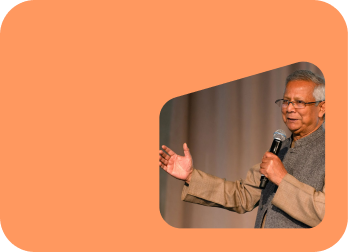Microfinance on way to China's poor
Microfinance on way to China's poor
By Xiao Ding (China Daily)
Updated: 2009-04-06 07:52
Source: https://www.chinadaily.com.cn/bw/2009-04/06/content_7650913.htm
---------------------------------------------------------------------------------------------------------------------------------------

Photo Caption: Emmanuel Faber, chief executive officer of Groupe Danone (second from left), and Muhammad Yunus (second from right) at the launching ceremony of the Danone Microfinance Foundation in Beijing in March. File photo
After teaming up with Grameen Group in March 2006 for a social business enterprise joint venture in Bangladesh, French food behemoth Groupe Danone has again joined hands with the Bangladesh-based group. But this time, it's about non-profit microfinance to the poor in China.
With the help of the State Council Leading Group Office of Poverty Alleviation and Development, Danone Microfinance Foundation was set up by Danone and Grameen Trust under Grameen Group in Beijing in March 2009.
The Grameen Group was established and placed under the leadership of Muhammad Yunus, the Nobel Peace Prize winner for his concept of microfinance in the 1970s, which he popularized and commercialized by founding the Grameen Bank. The Grameen Bank has since grown into a multifaceted group of profitable and non-profit ventures.
Yunus first implemented the idea of microfinance in 1976 by lending $27 to 42 women from rural areas of Bangladesh. Thanks to his help, the women eventually rose out of poverty and made a living by themselves through the small loans.
Yunus then translated the idea around Bangladesh and outside the country as well, earning the nickname: "banker for the poor". Over the past three decades, Grameen Bank has established more than 2,500 branches worldwide, granting loans worth $7.05 billion to 7.5 million poor people.
Under the agreement, Danone will inject 20 million yuan into the foundation for microfinance projects in China, and Grameen Trust will offer technical assistance. The Group Office of Poverty Alleviation and Development is in charge of conducting the projects.
Through the microfinance service, Yunus aims to provide small loans to the small-scale businesses or to the poor, mostly women, to lift themselves out of poverty and make better lives for their families. The lenders needn't find a guarantee for the loan, and they needn't hurry in paying off the debts as the interest is kept low.
The Danone Microfinance Foundation targets poor families and individuals from the earthquake-stricken areas in Southwest China's Sichuan province, helping them to start their own business or rebuild their homeland.
In May 2008, Sichuan suffered an 8.0-magnitude earthquake epicentered in Wenchuan city. The disaster is estimated to have caused losses worth 845.1 billion yuan.
Since then, Danone and Grameen Trust have applied with the Group Office of Poverty Alleviation and Development for putting the microfinance program on trial in the quake-devastated areas, said Emmanuel Faber, chief executive officer (CEO) of Danone.
"We want to start the program in the most difficult part of China. The immediate answer is Sichuan," said Yunus.
Through the program, Danone expects to gain experience in microfinance and explore a way to help other areas in China get out of poverty, Faber said.
The program was first conducted in six counties, including the quake-stricken regions of Mianzhu and Shifang and four other poor areas in Inner Mongolia autonomous region and Hebei province.
The foundation set the following goals for the program: In two years, the six microfinance organizations would be running well, and in three years, through the organizations, loans worth 168 million yuan could be granted to 24,000 rural residents annually. In the long-term, success in the six counties would hopefully be translated into many other poor regions, said Faber.
The foundation appointed an executive council responsible for managing and guiding the organizations in the right way and coordinating relations.
According to Yunus, good management could lead to a return ratio as high as 99 percent.
"The cooperation and the foundation provide a clue on how to develop the microfinance in China," said Fan Xiaojian, director of the Group Office of Poverty Alleviation and Development.
Besides the 20 million yuan, Danone said it will allocate another 50 million yuan for the microfinance programs tailored for earthquake-stricken areas, appointing the Grameen Bank to run those programs.
The concept of microfinance is not new in China. Early in the 1990s, the Rural Development Research Institution under the Chinese Academy of Social Sciences introduced the idea.
In 2006, when Yunus visited China, he signed the cooperative agreement with the Chinese government, but the project could not come into operation due to policy hurdles. Yunus has called for preferential policies launched by the Chinese government for implementation.
Yunus has successfully launched the microfinance model in nations and regions outside Bangladesh, including Mexico and Turkey.
This is the second time Danone has cooperated with Grameen Group. In March 2006, the two sides formed a 50/50 joint venture, Grameen Danone Foods Social Business Enterprise (GDF), whose primary objective was to maximize benefits to society rather than to maximize profits.
The GDF set up a yogurt manufacturing base in Bangladesh. The company developed yogurt that is nutritional and economical, selling at 10 cents apiece, and distributed the yogurt to local women to sell around the nation. The investment proved to be a success, and Danone plans to set up another yogurt manufacturing base in Bangladesh.
(China Daily 04/06/2009 page10)
Snapshort:



 SOCIAL BUSINESS
SOCIAL BUSINESS 

 Events
Events News
News





